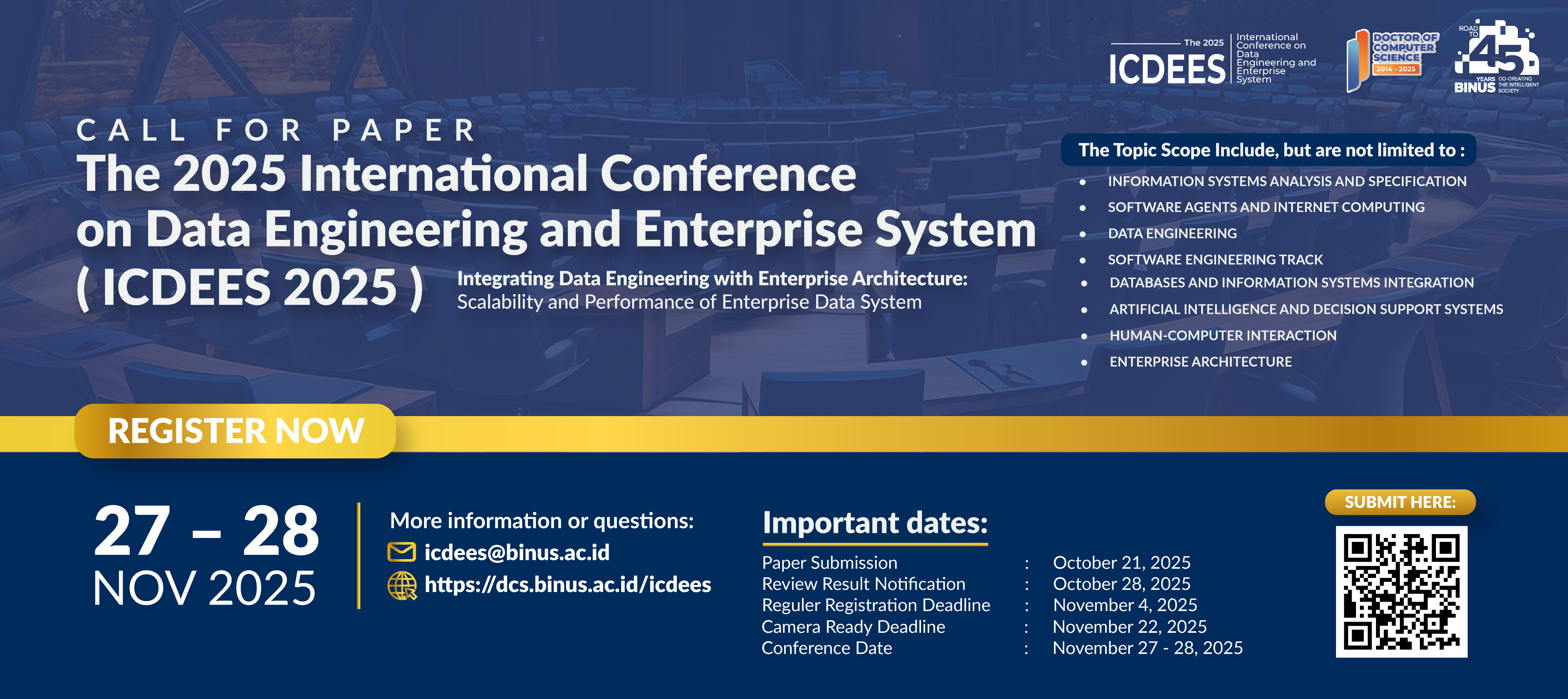Conference Areas

Each of these topic areas is expanded below but the sub-topics list is not exhaustive. Papers may address one or more of the listed sub-topics, although authors should not feel limited by them. Unlisted but related sub-topics are also acceptable, provided they fit in one of the following main topic areas:
1. DATABASES AND INFORMATION SYSTEMS INTEGRATION
2. ARTIFICIAL INTELLIGENCE AND DECISION SUPPORT SYSTEMS
3. INFORMATION SYSTEMS ANALYSIS AND SPECIFICATION
4. SOFTWARE AGENTS AND INTERNET COMPUTING
5. HUMAN-COMPUTER INTERACTION
6. ENTERPRISE ARCHITECTURE
7. DATA ENGINEERING
8. SOFTWARE ENGINEERING
——
AREA 1: DATABASES AND INFORMATION SYSTEMS INTEGRATION
Coupling and Integrating Heterogeneous Data Sources
Organisational Issues on Systems Integration
Enterprise Resource Planning
Databases in the Cloud and Cloud Data Management
Data Mining and Knowledge Discovery
Data Warehouses and OLAP
Performance Evaluation and Benchmarking
Large Scale Databases
Non-Relational Databases
Query Languages and Query Processing
Distributed Database Systems
Database Security
Blockchain Systems
Big Data, Data Science and Analytics
Subjective Databases, Data Quality, Curation and Provenance
AREA 2: ARTIFICIAL INTELLIGENCE AND DECISION SUPPORT SYSTEMS
Group Decision Support Systems
Industrial Applications of Artificial Intelligence
Strategic Decision Support Systems
Advanced Applications of Neural Network
Applications of Expert Systems
Intelligent Agents
Autonomous Agents & Multi-Agent Systems
Scheduling and Planning
Operational Research
Problem Solving
Natural Language Interfaces and Systems
Deep Learning
Social Intelligence
Robotics in Business
Creativity
Context-aware Pervasive Systems
AREA 3: INFORMATION SYSTEMS ANALYSIS AND SPECIFICATION
Software Engineering
Knowledge Management
Modelling of Distributed Systems
Ontology Engineering
Security
Simulation and Digital Twins for IS
Requirements Analysis and Management
Tools, Techniques and Methodologies for System Development
Model Driven Architectures and Engineering
Modelling Formalisms, Languages, and Notations (E.G. UML, ER Variants)
Project Management
Semiotics in Information Systems
Software Metrics and Measurement
Agile Methodologies and Applications
Dependable Systems for Critical Applications
Parallel Computing
Domain Specific and Multi-aspect IS Engineering
AREA 4: SOFTWARE AGENTS AND INTERNET COMPUTING
Wireless and Mobile Computing
Ubiquitous Computing
Interoperability
Web Services
Collaborative Computing
Electronic Commerce
Profiling and Recommendation Systems
Internet of Things
Semantic Web Technologies and Applications
Distributed Systems
Trust and Privacy
Mobile Security Issues and Privacy
Conversational Agents, ChatBots and LLM for IS
Cyber-Social Systems
Emerging Applications of Agent-based Systems
AREA 5: HUMAN-COMPUTER INTERACTION
HCI on Enterprise Information Systems
Human Factors
Guidelines, Principles, Patterns and Standards
Adaptive and Adaptable User Interfaces
Interaction Techniques and Devices
Interface Design
Emotional and Affective Computing
Accessibility and Usability
Collaborative and Social Interaction
User Experience
Design and Evaluation
User Behavior Analysis
Interaction Models, Virtual Reality / Augmented Reality
Trust and Transparency
Machine Learning in HCI
Ethics, Privacy and Security of HCI
AREA 6: ENTERPRISE ARCHITECTURE
Enterprise Engineering
Models and Frameworks
Business Modelling and Business Process Management
Business-IT Allignment
EA Adoption and Governance
EA and Organizational Theory and System Development
EA and Service Oriented Architecture (SOA)
Methods, Processes and Patterns for EA Development
Measurements, Metrics and Evaluation of EA Artefacts and Processes
Architectures and Design Principles for Enterprise Repositories
Evolution of EA
Digital Transformation
EA Tools and Applications
Enterprise Content Management
Supply Chain Planning and Management
Enterprise Architecture and Industry 4.0
AREA 7: DATA ENGINEERING
Data and Knowledge Modeling
Information Management Practices
Knowledge-Based Management Systems
Knowledge Discovery in Data
Data/Process Mining
Semantic Web Technology
Web Analytics
Business Intelligence
Ontology
Data Visualization & Analytics
Data Science
Database Technology
Spatial and Temporal Database
Distributed Database
Open Data
Big Data
Data and Information Security
AREA 8: SOFTWARE ENGINEERING TRACK
Software Engineering Process & Lifecycle
Software Analysis and Design Methods
Software Quality Assurances
Open Source Software
Software Measurement
Requirements Engineering
Agile Methodology
Extreme Programming
Empirical Software Engineering
Software Engineering Education
Software Project Management
Software Industry
Software Product Line
Security Software and System
Software Architecture
Cloud Computing
Software Engineering Tools
Software Technologies
SOA (Service Oriented Architecture)
Business Process Management System
Ultra Large-Scale System
Artificial Intelligence for Software Engineering

